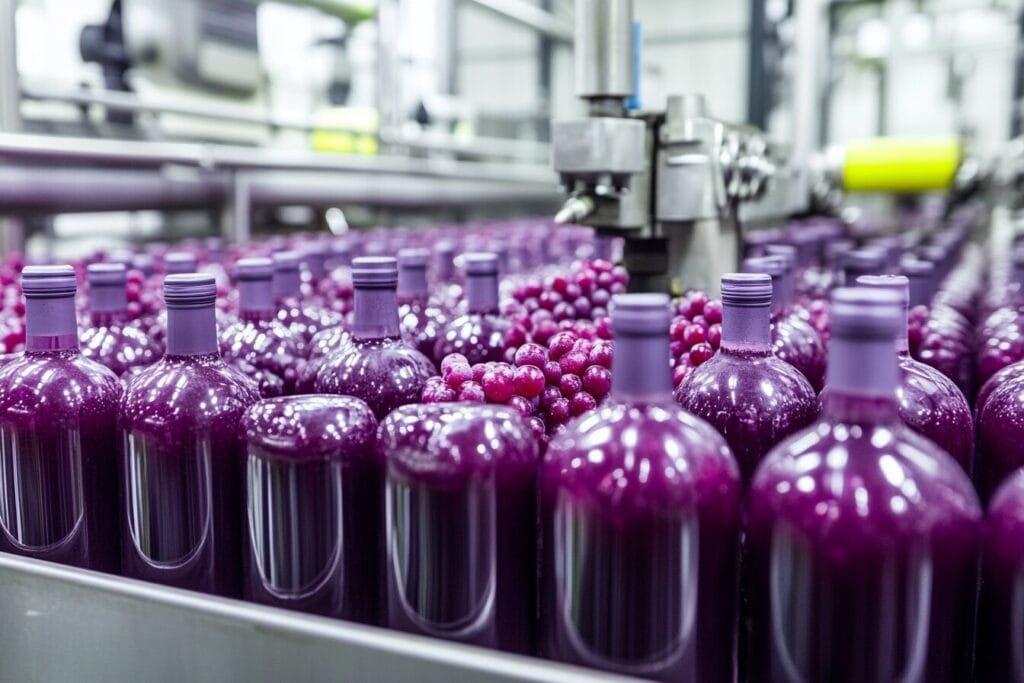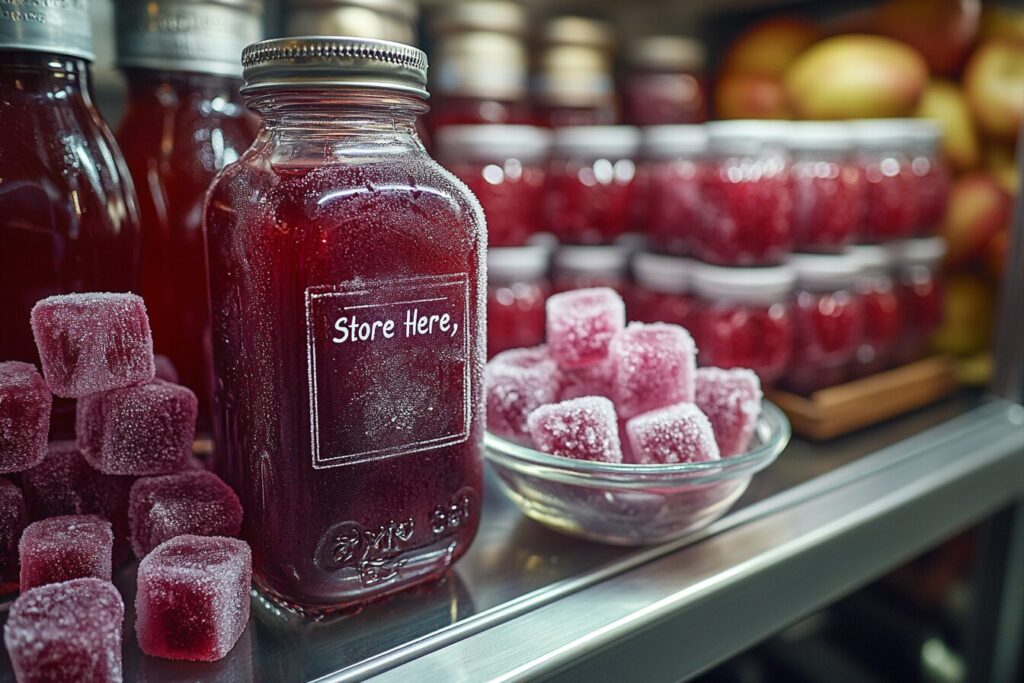Introduction
Grape juice is a classic, beloved beverage enjoyed by people of all ages. It’s sweet, refreshing, and full of nostalgia—who doesn’t love a cool glass on a hot day? But if you’ve ever wandered the juice aisle, you’ve probably noticed a specific kind of grape juice labeled “Concord Grape Juice.” So, what’s the deal? Are they the same? Or is there a deeper, juicier story behind these two drinks? Let’s dive into the details and uncover the truth!

Overview of Grape Varieties
Types of Grapes Used in Juice Production
Did you know not all grape juice is created equal? Regular grape juice is often made from a variety of grapes, including red, green, or purple ones. These grapes are grown worldwide, from sunny California vineyards to European farms. They’re typically chosen for their balance of sweetness and juiciness—perfect for mass production.
However, these grapes lack a certain “oomph” in flavor. Think of them as the vanilla ice cream of the grape world—good, but not extraordinary.
What Makes Concord Grapes Unique
Concord grapes, on the other hand, are the rockstars of the grape world. They’re a specific variety of purple grape, known for their bold, tangy, and slightly earthy flavorThese grapes originated in Concord, Massachusetts, and they’re celebrated for their thick skins and intense taste.
In a way, regular grapes are the smooth jazz, while Concord grapes are the electrifying rock concert—full of personality and unforgettable.
“Concord grapes are to grape juice what espresso is to coffee: concentrated, rich, and undeniably bold.”
Production Processes
How Grape Juice is Made
Let’s talk juice-making! Regular grape juice undergoes a pretty straightforward process. First, the grapes are washed and crushed to extract their liquid. The juice is then filtered to remove seeds, skins, and pulp before being pasteurized for safety. Add some sugar (sometimes), and voila! You’ve got the grape juice most of us grew up loving.
The Specific Process for Making Concord Grape Juice
Concord grape juice, however, is a bit fancier. It often includes the skins during the pressing process, which gives it that deep purple hue and extra boost of antioxidants. The natural sugars and bold flavors of Concord grapes mean there’s no need for added sweeteners, making it a more authentic and nutrient-packed choice.

Nutritional Differences
Let’s get to the heart of the matter: how do these juices compare nutritionally? Spoiler alert—they’re not as similar as you might think!
| Nutrient | Regular Grape Juice (1 cup) | Concord Grape Juice (1 cup) |
|---|---|---|
| Calories | 152 | 140 |
| Sugars | 36g | 34g |
| Vitamin C | 15% DV | 20% DV |
| Antioxidants | Moderate | High |
| Polyphenols | Low | High |
Vitamins and Minerals in Regular Grape Juice
Regular grape juice is a decent source of vitamin C and some natural sugars, which give you that quick energy boost. But it’s not exactly a powerhouse when it comes to antioxidants or polyphenols (the good stuff that fights free radicals in your body).
Nutritional Profile of Concord Grape Juice
Concord grape juice takes things up a notch. It’s loaded with antioxidants, thanks to those thick skins and bold flavors. This juice isn’t just a drink—it’s practically a health elixir! Plus, it’s richer in polyphenols, which are linked to improved heart health and better immunity.
Taste and Flavor Profiles
General Taste of Grape Juice
Regular grape juice has a mild, sweet taste. It’s the kind of juice that doesn’t demand attention—pleasant, but not particularly memorable. It’s like your friendly neighbor: reliable but not exactly the life of the party.
Concord Grape Juice: A Richer Flavor Experience
Concord grape juice, on the other hand, is bold and complex. Its rich, tangy, and slightly musky flavor hits your taste buds like a fireworks show. It’s the kind of drink that makes you pause and go, “Wow, what is this magic?”
Common Uses and Benefits
Versatile Uses of Grape Juice
Regular grape juice is the ultimate multitasker. It’s used in everything from popsicles to cocktails, and even as a natural sweetener in recipes.
Unique Applications :
Concord grape juice, due to its intense flavor, often shines in more specialized roles. Think artisanal popsicles, premium jellies, or even as a glaze for meats. It’s like the secret ingredient that takes a dish from good to gourmet.

Health Benefits
General Health Benefits of Grape Juice
Let’s not underestimate regular grape juice—it’s not just sugary water. 🍇 It provides hydration, a touch of vitamin C, and quick energy, making it a great choice for post-workout recovery or when you’re feeling low on fuel. Plus, it’s a fantastic option for kids who need a natural energy boost without the caffeine of sodas.
But here’s the catch: the lack of antioxidants and polyphenols means it doesn’t pack the same health punch as its Concord cousin. Think of it as the warm-up act at a concert—it’s good, but not the main event.
Why Concord Grape Juice is Often Considered Superior
Now, let’s talk about the superstar. Concord grape juice is like the health guru of the juice world. Packed with antioxidants, polyphenols, and natural compounds, it’s known to support heart health, boost immunity, and even improve brain function.
“Drinking Concord grape juice daily is like giving your body a superhero cape—ready to fight off the bad guys (aka free radicals).”
It’s also linked to reducing inflammation, which is a major win for anyone dealing with chronic health issues. And because it’s often made without added sugars, it’s a healthier choice overall.
Common Problems and Solutions
Even the best juices come with a few hiccups. Let’s tackle some common issues.
Shelf Life and Storage Issues
One problem with both regular and Concord grape juice is spoilage. Once opened, juice needs to be refrigerated and consumed within 7–10 days. Otherwise, it might start to ferment (and not in a good way).
Solution: Always check the expiration date, and if you’re not a heavy juice drinker, consider buying smaller bottles. Pro tip: Freeze leftover juice in ice cube trays for later use in smoothies or recipes.
Acidity and Digestive Concerns
Some people find grape juice—especially Concord—too acidic, which can lead to an upset stomach.
Solution: Try diluting the juice with water or mixing it with a milder juice like apple or pear. This keeps the flavor but tones down the acidity.
Identifying Pure Juices vs. Juice Blends
Labels can be deceiving! Many grape juices are actually blends with added sugars or artificial flavors.
Solution: Always read the ingredients list. Look for “100% juice” and avoid anything with high-fructose corn syrup or mysterious “natural flavors.” If it says “Concord grapes,” you’re probably in good hands.
Buying Guide
Tips for Choosing Quality Grape Juice
Whether you’re grabbing a bottle of regular or Concord grape juice, here’s what to look for:
- Ingredients List: The shorter, the better. Ideally, it should just say “grape juice” and maybe water.
- Color: High-quality grape juice will have a deep, rich color. Anything too pale might be overly processed.
- Packaging: Go for glass bottles when possible—they’re better for preserving flavor and nutrients.
How to Identify Authentic Concord Grape Juice
When it comes to Concord grape juice, look for these telltale signs:
- Mention of Concord Grapes: The label should specify the type of grape used.
- No Added Sugar: Concord grapes are naturally sweet, so no extra sugar is needed.
- Dark Purple Color: The deeper the purple, the richer the flavor.
Environmental and Ethical Considerations
Sustainable Grape Farming Practices
Here’s something you might not think about: how your juice is grown matters! Conventional grape farming often relies on pesticides, which can harm the environment. On the other hand, organic farming practices prioritize sustainability.
Fun Fact: Some Concord grape producers are certified organic, meaning their farming methods are better for the planet.
Supporting Local Concord Grape Growers
Supporting local producers of Concord grape juice benefits more than just your palate—it boosts the economy and sustains small farmers. Choosing local means preserving traditional farming practices, encouraging sustainable agriculture, and fostering community growth. It’s a delicious way to make a positive impact!
FAQs
What’s the main difference between these two juices?
Regular grape juice typically comes from a mix of grape varieties and has a mild, sweet flavor. The Concord variety, however, is exclusively made from Concord grapes, which give it a richer, tangier taste and higher levels of antioxidants.
Is Concord juice healthier?
Absolutely! Thanks to its abundance of antioxidants and polyphenols, this juice is often seen as the healthier option. These nutrients support heart health and help fight free radicals.
Can it be used in recipes?
Definitely! The bold flavor of Concord-based beverages makes them perfect for creating glazes, jellies, and even cocktails. They add a unique intensity to dishes.
How can I ensure I’m buying authentic Concord juice?
Check for labels that say “100% Concord.” Avoid products with added sugars or artificial ingredients. Look for its characteristic deep purple hue and rich, tangy flavor.
Is it more expensive?
Yes, Concord-based options are often pricier because of the unique grapes and their higher nutritional value. Many agree the taste and benefits are worth it.
Conclusion
In summary, regular grape juice is a reliable, sweet option that’s perfect for everyday enjoyment. It’s mild in flavor, widely available, and offers a decent boost of vitamin C and hydration, making it a classic choice for families and casual drinkers. However, it doesn’t have the same depth of nutrients or bold flavor that sets Concord grape juice apart.
Concord grape juice, with its rich, tangy taste and high levels of antioxidants and polyphenols, is a true standout in the juice world. It’s not just a drink—it’s a health-packed powerhouse that supports heart health, reduces inflammation, and provides a uniquely intense flavor experience. Whether you’re enjoying it on its own or using it in recipes, Concord grape juice delivers a richer, more fulfilling sip every time.

